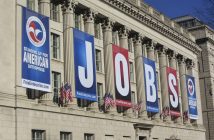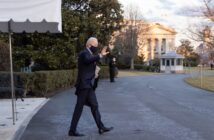The Trump administration recently took decisive action to reform the controversial H-1B guestworker program at a critical time. The Department of Labor (DOL) issued a rule changing the way that the department sets wage levels for H-1B workers, who for decades earned significantly less than Americans in the same line of work, thereby giving employers an enormous incentive to hire foreigners instead of Americans. The Department of Homeland Security (DHS) also issued a rule to give the agency new tools to enforce existing laws and monitor worksites and employers that abuse the H-1B program in order to avoid hiring American workers.
Within days, businesses reliant on cheap foreign labor stepped in. Seven IT service providers and trade group ITServe Alliance filed a lawsuit against the administration, furious at DHS for cracking down on the “body shop” model of H-1B hiring frequently used by Indian technology firms. The rule changes further ignited the fury of corporate lobbyists and their advocacy organizations in Washington. The U.S. Chamber of Commerce and the National Association of Manufacturers (NAM) – two of Washington’s most powerful business lobbying groups – sued the Trump Administration. Their lawsuit alleges that that the Trump administration failed to follow the Administrative Procedure Act (APA), despite the Administration’s justification that continued economic hardships due to the COVID-19 pandemic necessitated that the rules go into effect immediately.
The reason for this lawsuit is simple: large corporations and businesses that are members of the Chamber and NAM do not want to pay higher costs for labor. From a business perspective that is perfectly understandable, but for federal immigration policymakers, it shouldn’t be, especially at a time when tens of millions of American workers are out of work.
In the lawsuit, the Chamber and NAM argue that holding down wages and employing foreign guestworkers while millions of Americans remain unemployed is actually good for the economy. That is, of course, only if you equate our total Gross Domestic Product (GDP) with overall economic prosperity. But GDP is just a number – what good is a high GDP if millions of Americans cannot find meaningful employment? What good is a high GDP if qualified American workers and college STEM graduates cannot find a job because a corporation like Amazon or Microsoft would rather pay an H-1B worker significantly less for the same position?
In a statement, NAM’s general counsel said that these rule changes are “unworkable for hundreds of thousands of American-based workers” [emphasis added]. The term American-based workers is telling. NAM, the Chamber of Commerce, Facebook, Google – none of these business groups or major corporations care about American workers. They only care about keeping labor costs low. They pine about “skilled immigration” because they benefit from the current H-1B rules that keep wages low for foreign guestworkers, and increasing their profits.
The result of these lawsuits is unclear. The Trump administration has lost crucial legal battles due to their failure to follow the APA, most notably when the Supreme Court blocked the president from ending the Deferred Action for Childhood Arrivals (DACA) program on the grounds that they had not followed the APA. The justification for bypassing the APA may have greater legal standing since the administration cited the COVID-19 pandemic as their reason for fast-tracking the implementation of these changes to the H-1B program. Ultimately, it is likely this will be yet another legal battle facing the administration of President Trump.
But even if he loses the November presidential election, the negative effects of the COVID-19 pandemic and economic crisis will linger. These rules protect American workers from some of those by leveling the playing field between H-1B workers and Americans, and removing the incentives to hire cheap foreign labor. It will be difficult for the next administration – even if Joe Biden wins – to justify removing these protections as long as unemployment remains high and American workers continue to struggle as the country recovers from COVID-related shutdowns.




